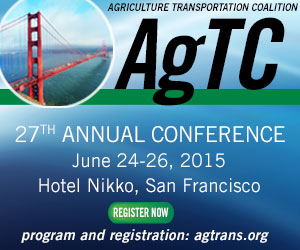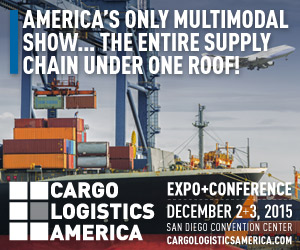|
The sharp rise of container ship sizes and alliances among the world’s largest shipping lines is overwhelming major U.S. ports, costing millions to shippers who can’t access their cargo on time and prompting the Federal Maritime Commission to threaten legal action if the parties don’t deal with the mess.
Container shipping is largely controlled by around 15 mostly European and Asian operators, which recently have sought to cut costs by increasing the pooling of operations within big alliances. The alliances have grown in recent years as carriers have introduced bigger vessels that are least twice the size of those that have been calling on U.S. ports for years.
As carriers put super-sized into play, the cargo-handling limitations at ports such as Los Angeles and Long Beach has become evident. Containers are often randomly unloaded, swamping terminal operators as they try to organize the boxes and move them to specific destinations by truck or rail.
"Existing terminals were designed two decades ago to handle ships half the size of today’s vessels, and with the alliances, six ships belonging to the same alliance can show up at five different terminals in Los Angeles and Long Beach." said Gene Seroka, executive director at the Port of Los Angeles. "This disperses cargo over a wider array of facilities making it challenging for truckers to pick the containers as well for western railways to amass the cargo and move it to specific destinations."
"We have 13 different terminals in Southern California. So there is a lot of confusion in picking up cargo," Seroka said.
Jonathan Gold, vice president of National Retail Federation, says its members have been levied by shipping companies with congestion charges to compensate for the for the extra time a vessel stays
|
at port while cargo is being shorted out.
Last month, the Federal Maritime Commission voted to call in all parties involved to discuss the issue and come up with proposals to address the problem. It said that in many cases, congestion charges are deemed unfair since importers, exporters and truckers aren't responsible for the delays, and the regulator warned it could penalize unfair practices by shipping companies and terminal operators.
"The message from cargo owners, importers and exports is loud and clear," said FMC Commissioner Richard Lidinsky. "These alliances and their big ships are causing major problems at U.S. ports and by our vote all parties involved will have to sit down over the next 90 days identify what went wrong and come up with solutions. After that, the FMC will have a clear picture and if needed get involved in specific cases with investigations, subpoenas and fines."
"We had shippers telling us they are being regularly charged for the congestion by shipping companies. The operators cause the congestion and they want to profit on top of it. This is unacceptable," Lidinsky said.
The FMC and other maritime regulators from the European Union and China will meet in Brussels in May to discuss whether the alliances are in line with international competition practices and their role in congestion at U.S. ports.
The big carriers in the business, such as Maersk Line and MSC, have said that pooling their resources and deploying bigger ships — such as the Triple-E class, which can carry in excess of 18,000 containers — cuts their costs and provides better service to cargo owners.
For more of the Wall Street Journal story: www.wsj.com
|


